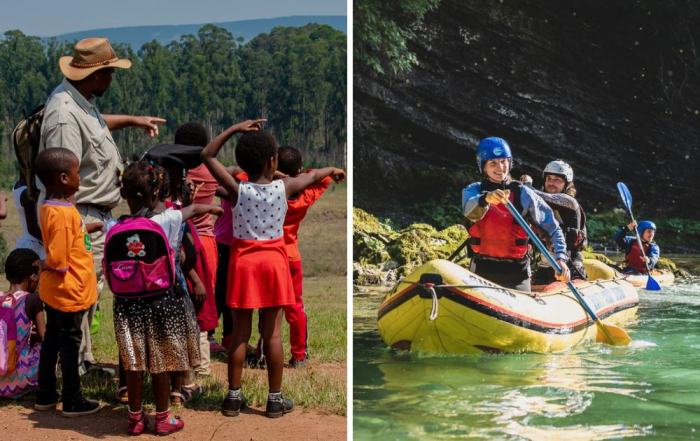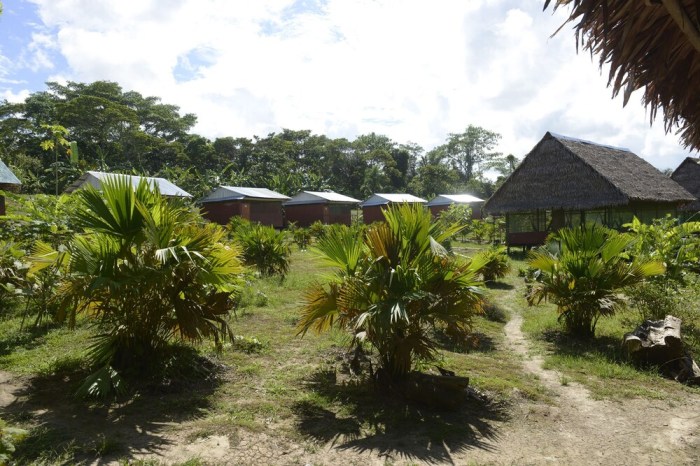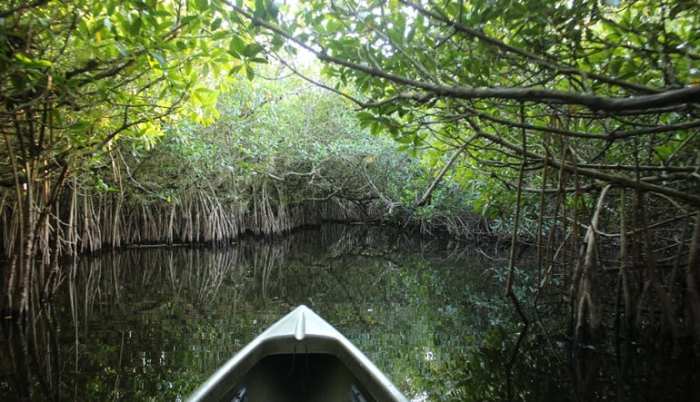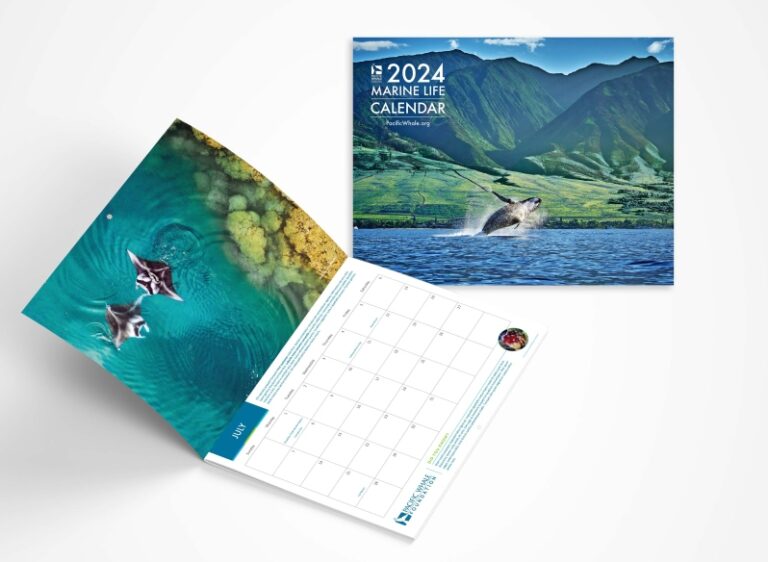Sustainable Travel Agency Eco-Friendly Journeys
A sustainable travel agency is revolutionizing the tourism industry by prioritizing environmental and social responsibility. It offers a unique travel experience, promoting eco-lodges, community tours, and responsible transportation options, all while supporting local communities and preserving natural environments.
This approach goes beyond simply minimizing impact; it actively seeks to maximize positive contributions to the destinations visited. By focusing on ethical practices and sustainable accommodations, the agency differentiates itself from traditional travel agencies, offering travelers a more meaningful and impactful journey.
Defining Sustainable Travel Agencies

Source: pebblemag.com
Sustainable travel agencies are emerging as a vital component of the tourism industry, offering travelers environmentally conscious and socially responsible options. These agencies prioritize minimizing the negative impacts of travel on destinations and communities while maximizing positive contributions. They go beyond simply promoting eco-tourism; they embody a holistic approach to travel, incorporating ethical considerations and economic benefits for local communities.
This shift reflects a growing awareness of the environmental and social consequences of traditional tourism practices. Sustainable travel agencies are designed to create a more positive and lasting impact for both travelers and the places they visit.
Key Principles and Practices of Sustainable Travel Agencies
Sustainable travel agencies operate on several key principles, encompassing environmental protection, social responsibility, and economic viability. They strive to minimize their environmental footprint by using eco-friendly transportation, supporting local businesses, and reducing waste. Social responsibility is also a central tenet, ensuring fair labor practices and community engagement. Economic viability is ensured through partnerships with local businesses and sustainable income generation for communities.
Differences Between Sustainable and Conventional Travel Agencies
Conventional travel agencies often prioritize maximizing profit and convenience for clients, sometimes at the expense of environmental and social concerns. Sustainable agencies, in contrast, prioritize the long-term well-being of destinations and communities. This difference manifests in the selection of destinations, the choice of transportation, the support of local businesses, and the engagement with local communities. Sustainable agencies often partner with local guides and operators who prioritize community involvement.
Certifications and Standards for Sustainable Travel Agencies
Several certifications and standards exist to guide and assess the sustainability practices of travel agencies. These certifications provide a framework for measuring and improving the environmental and social impact of travel. Examples include the Global Sustainable Tourism Council (GSTC) standards, which encompass environmental, social, and economic criteria. Other certifications focus on specific aspects, like carbon offsetting or fair trade practices.
Examples of Sustainable Travel Agency Business Models
Various business models are employed by sustainable travel agencies. Some focus on adventure tourism in remote locations, emphasizing responsible interaction with the natural environment. Others specialize in cultural immersion experiences, connecting travelers with local communities and supporting their cultural heritage. Some agencies focus on promoting sustainable accommodations, partnering with eco-lodges and homestays. Further models combine several of these approaches, offering a diverse range of sustainable travel experiences.
Comparison of Sustainable and Conventional Travel Packages
| Package Type | Sustainability Features | Price |
|---|---|---|
| Conventional Tour Package | Limited focus on sustainability. May include some eco-friendly options, but often prioritize low prices and convenience. | Generally lower than sustainable packages |
| Sustainable Adventure Tour | Emphasis on eco-friendly transportation (e.g., bicycles, local buses), community engagement, and minimizing environmental impact. Accommodation in eco-lodges or homestays. | Often higher than conventional packages due to the cost of sustainable practices. |
| Sustainable Cultural Immersion Trip | Focus on supporting local communities through direct interaction with local artisans, guides, and businesses. Use of local transportation and accommodation options. | Generally higher than conventional packages, but often aligns with the value of the experience. |
Sustainable Travel Agency Services and Offerings

Sustainable travel agencies are more than just booking tools; they curate unique experiences that prioritize environmental and social responsibility. They carefully select accommodations, transportation, and activities that minimize their impact on the planet and empower local communities. This commitment extends beyond simple eco-tourism, fostering genuine connections with destinations and their people.
These agencies go beyond the typical vacation package, offering tailored journeys that align with individual values and sustainability goals. They provide a comprehensive approach to travel, addressing the environmental and social concerns associated with traditional tourism.
Types of Services Offered
Sustainable travel agencies provide a wide array of services that go beyond basic travel arrangements. They often act as consultants, guiding clients through eco-friendly options and offering tailored itineraries. These agencies can handle all aspects of travel planning, from flight arrangements and accommodation bookings to curated activities and cultural experiences. They also frequently offer pre-trip consultations to educate travelers about sustainable practices and local customs.
Unique Travel Experiences and Destinations
These agencies promote destinations that showcase the beauty and culture of the region while minimizing environmental harm. They highlight destinations that prioritize responsible tourism, empowering local communities and protecting natural resources. Experiences may include community-based tours, eco-lodges, or wildlife viewing safaris conducted in a way that respects the ecosystem and supports conservation efforts.
Examples of Sustainable Accommodations, Transportation, and Activities
Sustainable accommodations often include eco-lodges, homestays, or hotels with green certifications, prioritizing energy efficiency and waste reduction. Transportation options frequently include electric vehicles, bicycles, or public transportation, reducing carbon emissions. Activities may involve participating in local community projects, supporting local artisans, or engaging in responsible wildlife viewing. For example, a sustainable tour might include a visit to a local organic farm, where visitors learn about sustainable agriculture practices and enjoy fresh produce.
Factors Contributing to the Appeal of Sustainable Travel Options
Several factors contribute to the appeal of sustainable travel options. These include the opportunity to connect with local communities, learn about diverse cultures, and contribute to conservation efforts. Travelers are increasingly seeking experiences that offer more than just relaxation; they desire a meaningful impact on the places they visit. A sense of personal fulfillment from responsible travel is a key draw.
Table of Sustainable Travel Experiences
| Experience Type | Description | Sustainability Impact | Target Audience |
|---|---|---|---|
| Eco-Lodges | Accommodation in environmentally friendly hotels or lodges, often featuring sustainable building materials, renewable energy, and waste reduction programs. | Reduced carbon footprint, minimized environmental impact, and support for local communities. | Eco-conscious travelers, nature enthusiasts, and those seeking a luxurious and responsible stay. |
| Community Tours | Guided tours that directly benefit local communities, offering opportunities to interact with locals, learn about their traditions, and support local businesses. | Economic empowerment of local communities, cultural exchange, and preservation of local traditions. | Culture enthusiasts, travelers seeking immersive experiences, and those interested in supporting local economies. |
| Responsible Wildlife Safaris | Wildlife viewing expeditions that prioritize ethical practices, minimize disturbance to wildlife, and promote conservation. | Protection of wildlife habitats, support for conservation efforts, and preservation of biodiversity. | Wildlife enthusiasts, nature photographers, and travelers seek to observe wildlife in their natural environment without harming them. |
| Sustainable Farm Stays | Experiences that involve staying on working farms, learning about sustainable agricultural practices, and enjoying fresh produce. | Support for sustainable agriculture, local food systems, and cultural exchange. | Foodies, nature enthusiasts, and those interested in learning about sustainable food production. |
Marketing and Branding of Sustainable Travel Agencies

Source: sustainabletravel.org
Sustainable travel agencies must effectively communicate their commitment to environmental and social responsibility to attract environmentally conscious travelers. This involves crafting a compelling brand identity that resonates with the target audience and showcases their unique value proposition. Strong marketing strategies are essential to stand out in a competitive market.
Effective marketing for sustainable travel agencies hinges on transparency and authenticity. Consumers are increasingly discerning and seek out businesses aligned with their values. By showcasing their ethical practices and sustainable initiatives, these agencies can build trust and loyalty among environmentally aware travelers. This transparency is critical for building a strong brand reputation and fostering customer engagement.
Key Marketing Strategies
Sustainable travel agencies employ various marketing strategies to connect with their target audience. These strategies range from social media campaigns to collaborations with like-minded organizations. Building a strong online presence and showcasing the agency’s commitment to sustainability are crucial for success.
- Social Media Marketing: Utilizing platforms like Instagram, Facebook, and TikTok to share visually appealing content showcasing sustainable travel experiences and destinations. This includes highlighting the environmental and social benefits of choosing sustainable travel options. Travel bloggers and influencers can play a vital role in promoting the agency and its offerings. Examples include showcasing eco-lodges, highlighting local communities supported by tours, and promoting carbon-offsetting initiatives.
- Content Marketing: Creating blog posts, articles, and videos about sustainable travel destinations, practices, and ethical considerations. This educational approach attracts environmentally conscious travelers who value information and knowledge about sustainable travel options. Case studies demonstrating the positive impacts of sustainable travel choices can also be beneficial.
- Partnerships: Collaborating with other sustainable businesses, organizations, and influencers to expand reach and offer a wider range of sustainable travel experiences. These partnerships can enhance the agency’s credibility and visibility in the sustainable travel sector. Examples include collaborations with eco-friendly hotels, tour operators, and conservation organizations.
- Public Relations: Building relationships with travel journalists, bloggers, and media outlets to garner positive coverage and showcase the agency’s commitment to sustainability. This includes issuing press releases, participating in industry events, and securing interviews to promote the agency’s work and mission.
Importance of Transparent Communication
Transparency is paramount in the sustainable travel sector. Consumers are more likely to support businesses that openly communicate their environmental and social impact. This includes details on carbon offsetting strategies, fair trade practices, and community involvement. Openly addressing any shortcomings or challenges related to sustainability fosters trust and builds a reputation for honesty. The agency’s commitment to ethical practices should be evident in every aspect of its marketing and operations.
Ethical Branding in Sustainable Travel
A strong brand identity is crucial for sustainable travel agencies. The brand should reflect the agency’s commitment to environmental and social responsibility. This includes using eco-friendly branding materials, promoting ethical sourcing, and communicating the agency’s sustainability initiatives. A strong brand fosters trust and recognition in the market. Logos, colors, and messaging should reflect the agency’s values and principles.
Examples of Effective Marketing Campaigns: Sustainable Travel Agency
Effective marketing campaigns highlight the sustainability aspects of travel. One example is a campaign showcasing the carbon footprint reduction achieved through a particular tour. Another example is showcasing the economic benefits to local communities through sustainable tourism initiatives. These campaigns typically involve storytelling that connects with consumers’ values and demonstrates the positive impacts of sustainable travel choices. Visual representations of these impacts can significantly strengthen the campaign’s message.
Building a Brand Identity
A brand identity that reflects a commitment to environmental and social responsibility should be clearly articulated. The agency’s mission statement, values, and goals should be clearly defined and reflected in all aspects of the business. A strong brand identity creates a consistent message across all platforms, enhancing the agency’s reputation. For example, the brand’s colors and imagery can evoke a sense of environmental consciousness, and the agency’s language can reflect ethical considerations.
Marketing Strategies Table
| Strategy | Description | Target Audience | Metrics |
|---|---|---|---|
| Social Media Campaigns | Engaging content showcasing sustainable travel experiences. | Environmentally conscious travelers, adventure seekers, and nature lovers. | Engagement rates, reach, website traffic, and leads generated. |
| Partnerships | Collaborations with eco-friendly businesses and organizations. | A wider range of travelers seeking unique experiences. | Increased brand awareness, new customer acquisition, and media mentions. |
| Content Marketing | Creating informative content about sustainable travel. | Travel enthusiasts, researchers, and potential clients. | Website traffic, blog post views, and lead generation. |
| Public Relations | Building relationships with travel journalists and media outlets. | A broader audience and potential clients through media exposure. | Media coverage, positive brand mentions, and increased website traffic. |
Final Conclusion: Sustainable Travel Agency

In conclusion, sustainable travel agencies are reshaping the future of tourism by combining responsible practices with exciting travel experiences. Their commitment to ethical and environmentally conscious travel is transforming how we explore the world, offering travelers a more rewarding and impactful way to discover new destinations while preserving their beauty for future generations. The future of travel is undoubtedly sustainable, and these agencies are leading the way.





